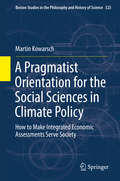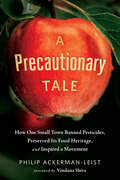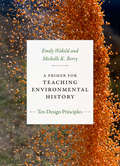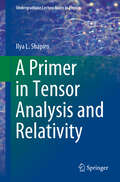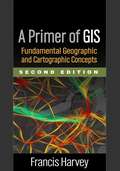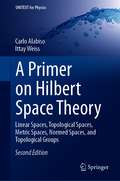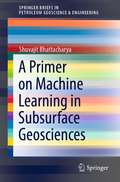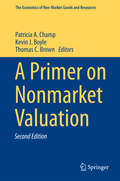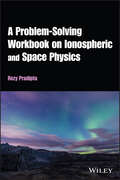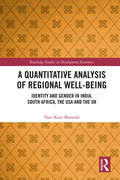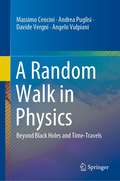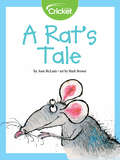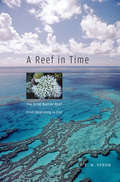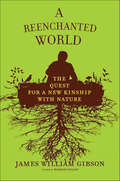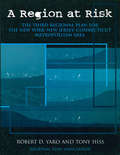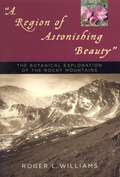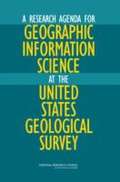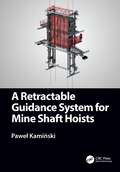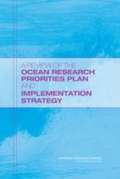- Table View
- List View
A Pragmatist Orientation for the Social Sciences in Climate Policy: How to Make Integrated Economic Assessments Serve Society (Boston Studies in the Philosophy and History of Science #323)
by Martin KowarschThis book develops a new science-policy model for the Intergovernmental Panel on Climate Change (IPCC) and other socio-economic assessments of climate policy options. The work presented in this volume is systematically based on John Dewey's philosophy and inevitable fact/value entanglement in economics, and this work adds to current debates on science in policy. The model developed here could also promote deliberative democracy as an alternative to value dogmatism or procedural liberalism. The "Pragmatic Enlightened Model" presented here shows that experts should, in a participatory process, map the entire solution space by exploring alternative political pathways and their manifold practical consequences. This would allow a rational consideration even of controversial, value-laden policy goals through a comparative evaluation of their consequences, potentially requiring a revision of said values or goals. This book provides orientation for both assessment practitioners and their critical observers. Policymakers, stakeholders and public officials in the field of climate policy will find this work of interest, as will scholars from various disciplines, especially economics. Furthermore, researchers working on deliberative democracy, philosophy of economics, pragmatist meta-ethics, models of PPA (public policy analysis), STS (science and technology studies) with a focus on scientific policy advice, RIA (regulatory impact assessment), as well as the history of global environmental assessments, will find this work particularly valuable.
A Prairie Boy's Winter
by William KurelekText and twenty color paintings depict the rigors and simple pleasures during the stark 1930s.
A Precautionary Tale: How One Small Town Banned Pesticides, Preserved Its Food Heritage, and Inspired a Movement
by Philip Ackerman-LeistMals, Italy, has long been known as the breadbasket of the Tyrol. But recently the tiny town became known for something else entirely. A Precautionary Tale tells us why, introducing readers to an unlikely group of activists and a forward-thinking mayor who came together to ban pesticides in Mals by a referendum vote—making it the first place on Earth to accomplish such a feat, and a model for other towns and regions to follow.For hundreds of years, the people of Mals had cherished their traditional foodways and kept their local agriculture organic. Their town had become a mecca for tourists drawn by the alpine landscape, the rural and historic character of the villages, and the fine breads, wines, cheeses, herbs, vegetables, and the other traditional foods they produced. Yet Mals is located high up in the eastern Alps, and the valley below was being steadily overtaken by big apple producers, heavily dependent on pesticides. As Big Apple crept further and further up the region&’s mountainsides, their toxic spray drifted with the valley&’s ever-present winds and began to fall on the farms and fields of Mals—threatening their organic certifications, as well as their health and that of their livestock. The advancing threats gradually motivated a diverse cast of characters to take action—each in their own unique way, and then in concert in an iconic display of direct democracy in action. As Ackerman-Leist recounts their uprising, we meet an organic dairy farmer who decides to speak up when his hay is poisoned by drift; a pediatrician who engaged other medical professionals to protect the soil, water, and air that the health of her patients depends upon; a hairdresser whose salon conversations mobilized the town&’s women in an extraordinarily conceived campaign; and others who together orchestrated one of the rare revolutionary successes of our time and inspired a movement now snaking its way through Europe and the United States.A foreword by Vandana Shiva calls upon others to follow in Mals&’s footsteps.
A Primer On String Theory
by Volker SchomerusSince its conception in the 1960s, string theory has been hailed as one of the most promising routes we have to unify quantum mechanics and general relativity. This book provides a concise introduction to string theory explaining central concepts, mathematical tools and covering recent developments in physics including compactifications and gauge/string dualities. With string theory being a multidisciplinary field interfacing with high energy physics, mathematics and quantum field theory, this book is ideal for both students with no previous knowledge of the field and scholars from other disciplines who are looking for an introduction to basic concepts.
A Primer for Teaching Environmental History: Ten Design Principles (Design Principles for Teaching History)
by Emily Wakild Michelle K. BerryA Primer for Teaching Environmental History is a guide for college and high school teachers who are teaching environmental history for the first time, for experienced teachers who want to reinvigorate their courses, for those who are training future teachers to prepare their own syllabi, and for teachers who want to incorporate environmental history into their world history courses. Emily Wakild and Michelle K. Berry offer design principles for creating syllabi that will help students navigate a wide range of topics, from food, environmental justice, and natural resources to animal-human relations, senses of place, and climate change. In their discussions of learning objectives, assessment, project-based learning, using technology, and syllabus design, Wakild and Berry draw readers into the process of strategically designing courses on environmental history that will challenge students to think critically about one of the most urgent topics of study in the twenty-first century.
A Primer in Tensor Analysis and Relativity (Undergraduate Lecture Notes in Physics)
by Ilya L. ShapiroThis undergraduate textbook provides a simple, concise introduction to tensor algebra and analysis, as well as special and general relativity. With a plethora of examples, explanations, and exercises, it forms a well-rounded didactic text that will be useful for any related course.The book is divided into three main parts, all based on lecture notes that have been refined for classroom teaching over the past two decades. Part I provides students with a comprehensive overview of tensors. Part II links the very introductory first part and the relatively advanced third part, demonstrating the important intermediate-level applications of tensor analysis. Part III contains an extended discussion of general relativity, and includes material useful for students interested primarily in quantum field theory and quantum gravity.Tailored to the undergraduate, this textbook offers explanations of technical material not easily found or detailed elsewhere, including an understandable description of Riemann normal coordinates and conformal transformations. Future theoretical and experimental physicists, as well as mathematicians, will thus find it a wonderful first read on the subject.
A Primer of Conservation Genetics
by Richard Frankham Jonathan D. Ballou David A. Briscoe Karina H. Mcinnes Richard Frankham Jonathan D. Ballou David A. BriscoeIntended for those with a limited background in genetic studies, this concise, entry-level text in conservation genetics is presented in a user-friendly format, with main points clearly highlighted. Solved problems are provided throughout to help illustrate key equations, although a basic knowledge of Mendelian genetics and simple statistics is assumed. A glossary and suggestions for further reading provide additional support for the reader. Numerous pen-and-ink portraits of endangered species bring the material to life. Also available: Introduction to Conservation Genetics ". . . balance[s] student need for clarity and brevity with the requirements of conservation professionals for detailed applications. <P> Advisory: Bookshare has learned that this book offers only partial accessibility. We have kept it in the collection because it is useful for some of our members. To explore further access options with us, please contact us through the Book Quality link on the right sidebar. Benetech is actively working on projects to improve accessibility issues such as these.
A Primer of GIS, Second Edition
by Francis HarveyThis accessible text prepares students to understand and work with geographic information systems (GIS), offering a detailed introduction to essential theories, concepts, and skills. The book is organized in four modular parts that can be used in any sequence in entry-level and more specialized courses. Basic cartographic principles are integrated with up-to-date discussions of GIS technologies and applications. Coverage includes everything from what geographic information is to its many uses and societal implications. Practical examples and exercises invite readers to explore the choices involved in producing reliable maps and other forms of geographic information. Illustrations include 170 figures (with 15 in color). The companion website provides links to Web resources for each chapter, plus downloadable PowerPoint slides of most of the figures. New to This Edition *Chapter on online mapping and Big Data. *New and updated discussions of remote sensing, vector and raster data models, location privacy, uses of geocoding, and other timely topics. *Chapter on the many uses of GIS, such as in market analyses, emergency responding, and tracking of epidemics. *Section overviews and an end-of-book glossary. Pedagogical Features *Modules and individual chapters can be used sequentially or in any order. *End-of-chapter review questions with answers, exercises, and extended exercises for applying theories and concepts. *"In-Depth" sidebars offering a closer look at key concepts and applications. *End-of-chapter links to relevant Web resources.
A Primer on Fourier Analysis for the Geosciences
by Robin CrockettTime-series analysis is used to identify and quantify periodic features in datasets and has many applications across the geosciences, from analysing weather data, to solid-Earth geophysical modelling. This intuitive introduction provides a practical 'how-to' guide to basic Fourier theory, with a particular focus on Earth system applications. The book starts with a discussion of statistical correlation, before introducing Fourier series and building to the fast Fourier transform (FFT) and related periodogram techniques. The theory is illustrated with numerous worked examples using R datasets, from Milankovitch orbital-forcing cycles to tidal harmonics and exoplanet orbital periods. These examples highlight the key concepts and encourage readers to investigate more advanced time-series techniques. The book concludes with a consideration of statistical effect size and significance. This useful book is ideal for graduate students and researchers in the Earth system sciences who are looking for an accessible introduction to time-series analysis.
A Primer on Hilbert Space Theory: Linear Spaces, Topological Spaces, Metric Spaces, Normed Spaces, and Topological Groups (UNITEXT for Physics)
by Carlo Alabiso Ittay WeissThis book offers an essential introduction to the theory of Hilbert space, a fundamental tool for non-relativistic quantum mechanics. Linear, topological, metric, and normed spaces are all addressed in detail, in a rigorous but reader-friendly fashion. The rationale for providing an introduction to the theory of Hilbert space, rather than a detailed study of Hilbert space theory itself, lies in the strenuous mathematics demands that even the simplest physical cases entail. Graduate courses in physics rarely offer enough time to cover the theory of Hilbert space and operators, as well as distribution theory, with sufficient mathematical rigor. Accordingly, compromises must be found between full rigor and the practical use of the instruments. Based on one of the authors’s lectures on functional analysis for graduate students in physics, the book will equip readers to approach Hilbert space and, subsequently, rigged Hilbert space, with a more practical attitude. It also includes a brief introduction to topological groups, and to other mathematical structures akin to Hilbert space. Exercises and solved problems accompany the main text, offering readers opportunities to deepen their understanding. The topics and their presentation have been chosen with the goal of quickly, yet rigorously and effectively, preparing readers for the intricacies of Hilbert space. Consequently, some topics, e.g., the Lebesgue integral, are treated in a somewhat unorthodox manner. The book is ideally suited for use in upper undergraduate and lower graduate courses, both in Physics and in Mathematics.
A Primer on Machine Learning in Subsurface Geosciences (SpringerBriefs in Petroleum Geoscience & Engineering)
by Shuvajit BhattacharyaThis book provides readers with a timely review and discussion of the success, promise, and perils of machine learning in geosciences. It explores the fundamentals of data science and machine learning, and how their advances have disrupted the traditional workflows used in the industry and academia, including geology, geophysics, petrophysics, geomechanics, and geochemistry. It then presents the real-world applications and explains that, while this disruption has affected the top-level executives, geoscientists as well as field operators in the industry and academia, machine learning will ultimately benefit these users. The book is written by a practitioner of machine learning and statistics, keeping geoscientists in mind. It highlights the need to go beyond concepts covered in STAT 101 courses and embrace new computational tools to solve complex problems in geosciences. It also offers practitioners, researchers, and academics insights into how to identify, develop, deploy, and recommend fit-for-purpose machine learning models to solve real-world problems in subsurface geosciences.
A Primer on Nonmarket Valuation (The Economics of Non-Market Goods and Resources #13)
by Thomas C. Brown Patricia A. Champ Kevin J. BoyleThis is a practical book with clear descriptions of the most commonly used nonmarket methods. The first chapters of the book provide the context and theoretical foundation of nonmarket valuation along with a discussion of data collection procedures. The middle chapters describe the major stated- and revealed-preference valuation methods. For each method, the steps involved in implementation are laid out and carefully explained with supporting references from the published literature. The final chapters of the book examine the relevance of experimentation to economic valuation, the transfer of existing nonmarket values to new settings, and assessments of the reliability and validity of nonmarket values. The book is relevant to individuals in many professions at all career levels. Professionals in government agencies, attorneys involved with natural resource damage assessments, graduate students, and others will appreciate the thorough descriptions of how to design, implement, and analyze a nonmarket valuation study.
A Problem-Solving Workbook on Ionospheric and Space Physics
by Rezy PradiptaA Problem-Solving Workbook on Ionospheric and Space Physics Enables students to understand and master basic and advanced concepts of space, atmosphere, and ionospheric physics A Problem-Solving Workbook on Ionospheric and Space Physics is a unique textbook that contains a set of problems and exercises accompanied with complete solutions that explore and elucidate the most relevant concepts in ionospheric and space physics. The author has chosen problems that are interesting topic-wise, challenging, and that exemplify the physical and mathematical reasoning in ionospheric and space physics. Specifically, the text conveys core concepts of ionospheric and space physics using a problem-based approach. Each problem elucidates prototypical aspects that readers can easily generalize. Each problem also consists of multi-part questions to facilitate step-by-step understanding. A short introduction to each problem defines the theme and provides context to the readers. In A Problem-Solving Workbook on Ionospheric and Space Physics, readers can expect to learn about: Remote sensing of ionospheric plasmas from the ground, ionospheric slab thickness of a transparent layer, reflectometry, and doppler effects in reflection/refraction of electromagnetic waves Chapman theory of ionospheric layer formation, magnetic fields generated by the equatorial electrojet current, and fundamentals of GPS total electron content (TEC) measurements Barker codes and radar pulse compression, abel inversion of ionosonde trace data, and phase and group velocities of acoustic-gravity waves The use of deconvolution in radar scans, sporadic-E layers and Kelvin-Helmholtz instability due to wind shear, and Brunt-Vaisala frequency Thanks to the careful selection of included material, A Problem-Solving Workbook on Ionospheric and Space Physics serves as a gateway for advanced students and early-career researchers towards actual research-level problems in the field. As the problems are textbook-agnostic, students can easily self-study and learn about the subject outside the classroom.
A Quantitative Analysis of Regional Well-Being: Identity and Gender in India, South Africa, the USA and the UK (Routledge Studies in Development Economics)
by Vani Kant BorooahUsing data from the World Values Survey, this book sheds light on the link between happiness and the social group to which one belongs. The work is based on a rigorous statistical analysis of differences in the probability of happiness and life satisfaction between the predominant social group and subordinate groups. The cases of India and South Africa receive deep attention in dedicated chapters on cast and race, with other chapters considering issues such as cultural bias, religion, patriarchy, and gender. An additional chapter offers a global perspective. On top of this, the longitudinal nature of the data facilitates an examination of how world happiness has evolved between 1994 and 2014. This book will be a valuable reference for advanced students, scholars and policymakers involved in development economics, well-being, development geography, and sociology.
A Question of Balance
by William D. NordhausAs scientific and observational evidence on global warming piles up every day, questions of economic policy in this central environmental topic have taken center stage. But as author and prominent Yale economist William Nordhaus observes, the issues involved in understanding global warming and slowing its harmful effects are complex and cross disciplinary boundaries. For example, ecologists see global warming as a threat to ecosystems, utilities as a debit to their balance sheets, and farmers as a hazard to their livelihoods. In this important work, William Nordhaus integrates the entire spectrum of economic and scientific research to weigh the costs of reducing emissions against the benefits of reducing the long-run damages from global warming. The book offers one of the most extensive analyses of the economic and environmental dynamics of greenhouse-gas emissions and climate change and provides the tools to evaluate alternative approaches to slowing global warming. The author emphasizes the need to establish effective mechanisms, such as carbon taxes, to harness markets and harmonize the efforts of different countries. This book not only will shape discussion of one the world's most pressing problems but will provide the rationales and methods for achieving widespread agreement on our next best move in alleviating global warming.
A Random Walk in Physics: Beyond Black Holes and Time-Travels
by Angelo Vulpiani Andrea Puglisi Massimo Cencini Davide VergniThis book offers an informal, easy-to-understand account of topics in modern physics and mathematics. The focus is, in particular, on statistical mechanics, soft matter, probability, chaos, complexity, and models, as well as their interplay. The book features 28 key entries and it is carefully structured so as to allow readers to pursue different paths that reflect their interests and priorities, thereby avoiding an excessively systematic presentation that might stifle interest. While the majority of the entries concern specific topics and arguments, some relate to important protagonists of science, highlighting and explaining their contributions. Advanced mathematics is avoided, and formulas are introduced in only a few cases. The book is a user-friendly tool that nevertheless avoids scientific compromise. It is of interest to all who seek a better grasp of the world that surrounds us and of the ideas that have changed our perceptions.
A Rat's Tale
by Ann McLainRats are opportunistic, living in human cities provides them with food, shelter, and everything else they need!
A Reef in Time: The Great Barrier Reef from Beginning to End
by J.E.N. VeronLike many coral specialists fifteen years ago, J.E.N. Veron thought Australia’s Great Barrier Reef was impervious to climate change. “Owned by a prosperous country and accorded the protection it deserves, it would surely not go the way of the Amazon rain forest or the parklands of Africa, but would endure forever. That is what I thought once, but I think it no longer.” This book is Veron’s Silent Spring for the world’s coral reefs. Veron presents the geological history of the reef, the biology of coral reef ecosystems, and a primer on what we know about climate change. He concludes that the Great Barrier Reef and, indeed, most coral reefs will be dead from mass bleaching and irreversible acidification within the coming century unless greenhouse gas emissions are curbed. If we don’t have the political will to confront the plight of the world’s reefs, he argues, current processes already in motion will become unstoppable, bringing on a mass extinction the world has not seen for 65 million years. Our species has cracked its own genetic code and sent representatives of its kind to the moon—we can certainly save the world’s reefs if we want to. But to achieve this goal, we must devote scientific expertise and political muscle to the development of green technologies that will dramatically reduce greenhouse emissions and reverse acidification of the oceans.
A Reenchanted World: The Quest for a New Kinship with Nature
by James William GibsonA surprising and enlightening investigation of how modern society is making nature sacred once againFor more than two centuries, Western cultures, as they became ever more industrialized, increasingly regarded the natural world as little more than a collection of useful raw resources. The folklore of powerful forest spirits and mountain demons was displaced by the practicalities of logging and strip-mining; the traditional rituals of hunting ceremonies gave way to the indiscriminate butchering of animals for meat markets. In the famous lament of Max Weber, our surroundings became "disenchanted," with nature's magic swept away by secularization and rationalization.But now, as acclaimed sociologist James William Gibson reveals in this insightful study, the culture of enchantment is making an astonishing comeback. From Greenpeace eco-warriors to evangelical Christians preaching "creation care" and geneticists who speak of human-animal kinship, Gibson finds a remarkably broad yearning for a spiritual reconnection to nature. As we grapple with increasingly dire environmental disasters, he points to this cultural shift as the last utopian dream—the final hope for protecting the world that all of us must live in.
A Region at Risk: The Third Regional Plan For The New York-New Jersey-Connecticut Metropolitan Area
by Tony Hiss Robert YaroRegional Plan Association, the nation's oldest regional planning organization, has worked since 1929 to improve the quality of life in the New York-New Jersey-Connecticut metropolitan area. The Association has crafted two long-term plans and successfully promoted their implementation through advocacy and coalition building.The Association's Third Regional Plan describes a series of key initiatives aimed at not only improving quality of life, but also at increasing economic competitiveness, encouraging more sustainable patterns of growth, and expanding opportunities and choice in employment, housing, and community.The Plan presents five major campaigns, each of which combines the goals of economic, equity, and environmental improvements. They are: Greensward -- to protect and restore large natural resource systems at the periphery of urbanized areas Centers -- to "recenter" regions that have experienced decades of sprawl growth Mobility -- to transform existing transit infrastructure to create a regional express rail network that would dramatically improve public transit, reduce highway congestion, and speed freight movement Workforce -- to provide the region's workforce with the skills and opportunities needed to participate in the economy of the future Governance -- to rationalize the activities of existing authorities, encourage service sharing among municipal governments, and encourage more effective state and regional land-use planning programs While focusing on the New York-New Jersey-Connecticut metropolitan area, the Plan's broad themes have universal applicability to regions throughout the industrialized world.
A Region of Astonishing Beauty: The Botanical Exploration of the Rocky Mountains
by Roger L. WilliamsAs we approach the bicentennial of the Lewis and Clark Expedition in 2004, attention will inevitably turn to the nineteenth-century explorers who risked life and limb to interpret the natural history of the American West. Beginning with Meriwether Lewis and his discovery of the bitterroot, the goal of most explorers was not merely to find an adequate route to the Pacific, but also to comment on the state of the region's ecology and its suitability for agriculture, and, of course, to collect plant specimens. In this book, Williams follows the trail of over a dozen explorers who "botanized" the Rocky Mountains, and who, by the end of the nineteenth century, became increasingly convinced that the flora of the American West was distinctive. The sheer wonder of discover, which is not lost on Williams or his subjects, was best captured by botanist Edwin James in 1820 as he emerged above timberline in Colorado to come upon "a region of astonishing beauty."
A Research Agenda For Geographic Information Science At The United States Geological Survey
by National Research Council of the National AcademiesComprehensive and authoritative baseline geospatial data content is crucial to the nation and to the U.S. Geological Survey (USGS). The USGS founded its Center of Excellence for Geospatial Information Science (CEGIS) in 2006 to develop and distribute national geospatial data assets in a fast-moving information technology environment. In order to fulfill this mission, the USGS asked the National Research Council to assess current GIScience capabilities at the USGS, identify current and future needs for GIScience capabilities, recommend strategies for strengthening these capabilities and for collaborating with others to maximize research productivity, and make recommendations regarding the most effective research areas for CEGIS to pursue. With an initial focus on improving the capabilities of The National Map, the report recommends three priority research areas for CEGIS: information access and dissemination, data integration, and data models, and further identifies research topics within these areas that CEGIS should pursue. To address these research topics, CEGIS needs a sustainable research management process that involves a portfolio of collaborative research that balances short and long term goals.
A Resonant Ecology (Sign, Storage, Transmission)
by Max RittsIn A Resonant Ecology, Max Ritts traces how sound’s integration into the environmental politics of Canada’s North Coast has paved the way for massive industrial expansion. While conservationists hope that the dissemination of whale songs and other nature sounds will showcase the beauty of local wildlife for people around the world, Ritts reveals how colonial capitalism can co-opt sonic efforts to protect the coast. He demonstrates how digital technologies allow industry to sonically map new shipping lanes and facilitate new ways of experiencing sound—premised not on listening, but on sound’s exploitable status as a data resource. By outlining how sound can both perpetuate and refuse capitalist colonialism, Ritts challenges the idea that the sonic realm is inherently liberatory and reveals sound to be a powerfully uncertain object. Through a situated geographical approach, he makes the case that only a decolonial and multigenerational environmental politics can counter the false promise of “sustainable marine development” held up by industry and the state.
A Retractable Guidance System for Mine Shaft Hoists
by Paweł KamińskiRope guidance of conveyances is commonly used in shafts of underground mines in numerous countries on almost every continent. This safe and economical way of guiding skips and cages does have one disadvantage, however, which is especially troublesome in the conditions present in the Polish mining industry. Rope-guided conveyances require additional support at mine levels, while shafts of Polish coal mines usually operate on many levels. Additional stiff guidance at mine levels used as a support negatively affects the effectiveness of rope-guided hoisting systems. The retractable guidance system was originally introduced at the 960 m level in the Leon IV shaft of the Rydułtowy coal mine in Rydułtowy (currently ROW mine, Rydułtowy department), Silesian voivodeship, Poland. This construction, consisting of moveable elements, similar to the typical stiff guidance used at mine levels, serves as a support for the conveyance whenever necessary. When it is retracted, it allows the cage to travel at full speed through the level, increasing the degree of effectiveness of the hoisting system of the Leon IV shaft. The retractable guidance system, the solution presented in this book, is a pioneering approach in the Polish mining industry. It has allowed improvement of the level of effectiveness of the Leon IV shaft of the Rydułtowy colliery. It is an innovative opportunity for rope guidance systems worldwide, as it solves their biggest problem in multi-level shafts.
A Review Of The Ocean Research Priorities Plan And Implementation Strategy
by National Research Council of the National AcademiesOcean research offers countless benefits, from improving fisheries management to discovering new drugs to enabling early detection of tsunamis and hurricanes. At the request of the Joint Subcommittee on Ocean Science and Technology (JSOST), the National Research Council convened a committee to review the draft and final versions of the Ocean Research Priorities Plan and Implementation Strategy described in Charting the Course for Ocean Science in the United States: Research Priorities for the Next Decade, which represents the first coordinated national ocean research planning effort involving all federal agencies that support ocean science. The plan presents an ambitious vision for ocean research that will be of great benefit to the ocean sciences community and the nation. This book contains both sets of findings (i.e., the committee's review of the JSOST's draft plan [A Review of the Draft Ocean Research Priorities Plan: Charting the Course for Ocean Science in the United States] and the review of the final plan). This book recommends that JSOST employ a variety of outreach mechanisms to continue to engage nonfederal partners in ocean research planning efforts, such as establishing external committees to provide scientific and technical advice and to review progress on implementation of the research plan.
